
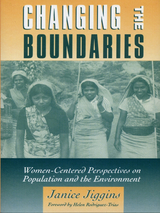
Changing the Boundaries explores gender relations with respect to education, reproductive health services, and agricultural resources -- three factors that are widely recognized as being central to the struggle for gender equity, population control, and environmental sustainability. As well as defining the role of women in the population-environment quandary, author Janice Jiggins explains how that role is the key to understanding issues of population and environment.
Throughout the volume, she makes extensive use of research, experience, and documentation that draws on the views and publications of women in the global South, much of which is available to development practitioners but is rarely found in academic libraries. Data, arguments, concepts, and analysis from a wide and varied range of sources are woven together to link the experience of women's daily lives with population policies and global environmental politics.
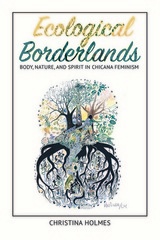
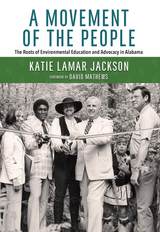
A Movement of the People: The Roots of Environmental Education and Advocacy in Alabama is a detailed history of the Alabama Environmental Quality Association (AEQA). The AEQA helped to establish groundbreaking environmental protection and natural resource preservation policies for the state and the region and grew into one of the nation’s most progressive environmental education efforts.
The AEQA began in 1966 with the relatively simple political action agenda of cleaning up unsightly and unsanitary roadside trash. These inspired citizens collaborated with civic leaders to identify and remove illegal rural dumps and create more regulated landfills statewide. Eventually they became involved in the “Keep America Beautiful” campaign and with the US Public Health Service in its attempt to rid the state of the yellow-fever mosquito vector, Aedes aegypti, which breeds in standing, fetid water. The acme of these early efforts was the passage of Alabama’s Solid Waste Disposal Law of 1969, one of the nation’s first such bills.
The AEQA’s dedicated staff and supporters spearheaded other environmental projects, many of which remain active today, such as recycling programs with industry giants throughout the Southeast and the founding of the Bartram Trail Conference, a multistate initiative to identify and preserve the path that Quaker botanist William Bartram took through the territory before its formation into states.
Using recorded interviews with Martha McInnis, executive vice president of the AEQA, and full access to a meticulously preserved archive of the organization’s papers and artifacts, Katie Lamar Jackson relates this previously untold story of remarkable “citizen activism.” A Movementof the People is a valuable account of the organization’s growth and advancement, both economically and societally, which serves as a blueprint for successful civic activism and grassroots organizing.
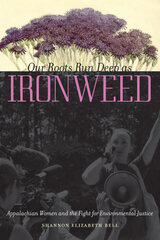
Motivated by a deeply rooted sense of place and community, Appalachian women have long fought against the damaging effects of industrialization. In this collection of interviews, sociologist Shannon Elizabeth Bell presents the voices of twelve Central Appalachian women, environmental justice activists fighting against mountaintop removal mining and its devastating effects on public health, regional ecology, and community well-being.
Each woman narrates her own personal story of injustice and tells how that experience led her to activism. The interviews--many of them illustrated by the women's "photostories"--describe obstacles, losses, and tragedies. But they also tell of new communities and personal transformations catalyzed through activism. Bell supplements each narrative with careful notes that aid the reader while amplifying the power and flow of the activists' stories. Bell's analysis outlines the relationship between Appalachian women's activism and the gendered responsibilities they feel within their families and communities. Ultimately, Bell argues that these women draw upon a broader "protector identity" that both encompasses and extends the identity of motherhood that has often been associated with grassroots women's activism. As protectors, the women challenge dominant Appalachian gender expectations and guard not only their families but also their homeplaces, their communities, their heritage, and the endangered mountains that surround them.
30% of the proceeds from the sale of this book will be donated to organizations fighting for environmental justice in Central Appalachia.
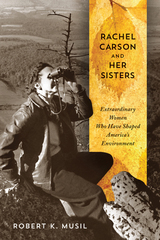
Choice Outstanding Academic Title
“In Rachel Carson and Her Sisters, Musil fills the gap by placing Carson's achievements in a wider context, weaving connections from the past through the present. Readers will find new insight into Carson and contemporary figures she influenced...who have historically received less attention. Musil’s respect and enthusiasm for these women is evident throughout the book, making it a deeply engaging and enjoyable read. A valuable addition to scholarship on Rachel Carson, female environmentalists, and the American environmental movement in general. Highly recommended. All academic and general readers.” —Choice
“This is a long overdue book, giving great credit to the long line of women who have done so much to shape our culture’s view of the world around us and of our prospects in it. We desperately need that culture to heed their words!” —Bill McKibben, author Oil and Honey: The Education of an Unlikely Activist
“A vibrant, engaging account of the women who preceded and followed Rachel Carson’s efforts to promote environmental and human health. In exquisite detail, Musil narrates the brilliant careers and efforts of pioneering women from the 1850s onward to preserve nature and maintain a healthy environment. Anyone interested in women naturalists, activists, and feminist environmental history will welcome this compelling, beautifully-written book.” —Carolyn Merchant, author of The Death of Nature and professor of environmental history, philosophy, and ethics, University of California, Berkeley.
“Bob Musil brilliantly documents the rich trajectory of women’s intellectual and political influence, not just on environmentalism but on public policy and activism. Musil offers fascinating details of Rachel Carson’s struggles to be taken seriously as a scientist and unearths the stories of the women—unsung heroes all—who influenced her. A must read for anyone interested in American history, science and environmental politics.” —Heather White, Executive Director, the Environmental Working Group
“Musil uses the life and writings of Rachel Carson as an exemplar of women’s participation in the American environmental movement. He places Carson’s achievements in contexts by illuminating...the lives of trailblazing female scientists who inspired her and for whom she, in turn, paved the way. Extremely well-researched.” —Foreword Reviews
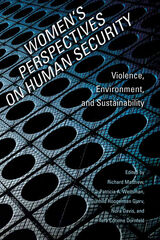
READERS
Browse our collection.
PUBLISHERS
See BiblioVault's publisher services.
STUDENT SERVICES
Files for college accessibility offices.
UChicago Accessibility Resources
home | accessibility | search | about | contact us
BiblioVault ® 2001 - 2024
The University of Chicago Press









